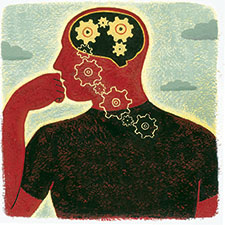Don't Twist My Arm
By Quinn Eastman
 A leg up. Putting your foot in your mouth. Strong arm. Back-handed compliment.
A leg up. Putting your foot in your mouth. Strong arm. Back-handed compliment.
Listening to metaphors involving arms or legs loops in a region of the brain responsible for visual perception of those body parts, scientists have discovered.
The finding, recently published in Brain & Language, is more evidence for “grounded cognition”—the idea that comprehension of abstract concepts in the brain is built upon concrete experiences, a proposal whose history extends back millennia to Aristotle.
When study participants heard sentences that included phrases such as “shoulder responsibility,” “foot the bill,” or “twist my arm,” they tended to engage a region of the brain called the left extrastriate body area (EBA). The same level of activation was not seen when participants heard literal sentences containing phrases with a similar meaning, such as “take responsibility” or “pay the bill.”
The study included 12 right-handed, English-speaking people, and blood flow in their brains was monitored by functional MRI.
“The EBA is part of the extrastriate visual cortex, and it was known to be involved in identifying body parts,” says senior author Krish Sathian, professor of neurology, rehabilitation medicine, and psychology at Emory.
Sathian’s research team had previously observed that metaphors involving the sense of touch, such as “a rough day,” activate a region of the brain important for sensing texture.





